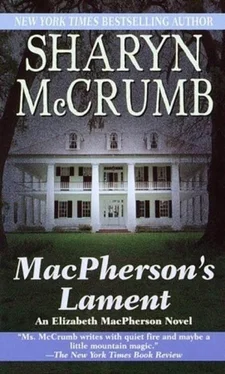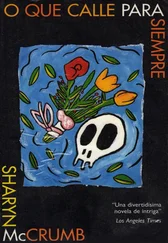Sharyn McCrumb - MacPherson's Lament
Здесь есть возможность читать онлайн «Sharyn McCrumb - MacPherson's Lament» весь текст электронной книги совершенно бесплатно (целиком полную версию без сокращений). В некоторых случаях можно слушать аудио, скачать через торрент в формате fb2 и присутствует краткое содержание. Жанр: Детектив, на английском языке. Описание произведения, (предисловие) а так же отзывы посетителей доступны на портале библиотеки ЛибКат.
- Название:MacPherson's Lament
- Автор:
- Жанр:
- Год:неизвестен
- ISBN:нет данных
- Рейтинг книги:3 / 5. Голосов: 1
-
Избранное:Добавить в избранное
- Отзывы:
-
Ваша оценка:
- 60
- 1
- 2
- 3
- 4
- 5
MacPherson's Lament: краткое содержание, описание и аннотация
Предлагаем к чтению аннотацию, описание, краткое содержание или предисловие (зависит от того, что написал сам автор книги «MacPherson's Lament»). Если вы не нашли необходимую информацию о книге — напишите в комментариях, мы постараемся отыскать её.
MacPherson's Lament — читать онлайн бесплатно полную книгу (весь текст) целиком
Ниже представлен текст книги, разбитый по страницам. Система сохранения места последней прочитанной страницы, позволяет с удобством читать онлайн бесплатно книгу «MacPherson's Lament», без необходимости каждый раз заново искать на чём Вы остановились. Поставьте закладку, и сможете в любой момент перейти на страницу, на которой закончили чтение.
Интервал:
Закладка:
A newly appointed captain, formerly an officer on the Virginia, herded them back to their posts. “Our orders are to guard this town. The Federals may soon be coming after our president. We protect them until somebody tells us different.” He looked around at the men under his command. “Hawks! Bridgeford! Escort these fugitives into town and see that their news is reported to Admiral-er, General Semmes. Tell him that we await further orders.”
Still dazed from this thunderbolt of news, Gabriel felt himself stagger out of the ditch like a stunned ox. He felt Bridgeford’s hand steadying him as he teetered on the edge of the embankment. “Is the war over, Tom?” he whispered, blinking away the wetness from his eyelashes.
“Not for us,” muttered Bridgeford.
“ I wish I was in the land of cotton.”
– DANIEL D. EMMETT,
“Dixie”
CHAPTER 4

THE FLIGHT TO Danville, Virginia, might have been relatively pleasant if it had started later in the day, and if they hadn’t had to change planes in Pittsburgh. Still, it was too much to ask for a direct flight to such a tiny place, Kimball supposed. The possibility of arriving by turnip truck had crossed his mind. He had read all of The New York Times with more than customary thoroughness and had given up trying to find something worth reading in the in-flight magazine when the pilot made the landing announcement. Mr. Huff, who had slept fitfully for most of the journey, was still stretched out in the adjoining seat, dreaming with an unpleasant expression that suggested that he was playing the villain in his own nightmare. Kimball hated to awaken the sleeping dragon, but it had to be done. With some misgivings he nudged Mr. Huff gently and whispered, “We’re coming into Danville, sir.”
With reptilian alertness Huff opened his eyes and leaned over Kimball to peer out the window. “Call that an airport?” he growled.
Kimball longed to point out that Mr. Huff’s own local airport, that of Westchester, New York, was about the size of a potting shed and contained tin-sheeted wooden baggage carousels that did not revolve, but he refrained from comment, rightly suspecting that the comparison would not be appreciated.
They gathered up their briefcases and made their way down the commuter plane’s metal ladder onto the tarmac. A flight of steps took them inside the terminal to a small glassed waiting area, which was empty except for a blond young man, holding aloft a sign that read: I TOLD YOU SO. Nathan Kimball grinned, remembering Mr. Huff’s insistence on being met with a welcoming sign. “I think that must be the sellers’ attorney, Mr. MacPherson,” he said, nodding toward the sign.
John Huff scowled at the placard. “Well, how was I to know?” he demanded of no one in particular. Then he seemed to make up his mind to be charming, because he thrust out his hand and assumed a brisk smile. “MacPherson! Good of you to meet us. When can we see the house?”
A flurry of introductions later, Bill replied, “We’ve been asked to wait until two o’clock to view the house, so as not to disturb the owners. They’ll be out this afternoon, but I think that I can answer any questions you might have.” He consulted his watch. “It’s just on twelve now. Why don’t I give you a quick tour of the city. It’s a rather historic place, you know. And then we can get some lunch at Ashley’s Buffet.”
“Yes, I’m rather interested in history,” said John Huff. “I’ve heard of Danville.”
“Everybody has, thanks to Johnny Cash,” said Bill. “I can show you where the train wreck was, though of course it’s all built over now. There is a historical marker.”
Huff stared at him. “Did you say train wreck?”
“Yes. The wreck of the old 97. It’s a folk song. Johnny Cash recorded it a good while back. Isn’t that how you heard of Danville?” Bill hummed a few bars of the song. “ ‘It’s a mighty rough road from Lynchburg to Danville, And a line on a three-mile grade.’ That’s us.”
Nathan Kimball fought back giggles as he tried to picture Mr. Huff as a fan of country music while that austere gentleman himself seemed to be choking on unspoken comments. Their native guide, happily oblivious to the visitors’ reactions, prattled on about Dan River textiles and pit-cooked barbecue. “And we do have one local celebrity. Have you ever heard of Wendell Scott?”
For the first time Huff looked interested. “General Winfield Scott of the Mexican War? I didn’t know he-”
“No, sir, not him. Wendell Scott, the stock car racer. Richard Pryor played him in a movie called Greased Lightning. He was from right around here, but I think they shot the film somewhere else. They usually do.”
“We’d very much like to see the city,” said John Huff in tones of strangled politeness.
“Of course, if you’re thinking of moving here, you probably have a lot of practical questions about the area,” said Bill. “What sort of business are you in, sir?”
“I am an investor, but American history is something of an avocation for me. I understand this house we’ll be looking at has some historic significance.”
“Yes sir. It dates back to the 1840s, and as you know, it has been used as the Home for Confederate Women since the turn of the century.”
“May I know to whom it belonged before that time?” asked Mr. Huff. “Was it by any chance a Colonel W. T. Sutherlin?”
“No,” said Bill, looking surprised. “According to the information on the deed, the house was owned by a Mr. Phillips.”
John Huff smiled. “Even better!” he declared, and strode off toward the parking lot, leaving the two attorneys scrambling after him to wonder why he had suddenly seemed so pleased.
A. P. Hill had never looked forward to a date with anything like the eagerness with which she anticipated her twenty-minute interview with Tug Mosier. She felt a shiver of excitement at the prospect of defending someone against the most serious of charges: first-degree homicide.
She would have to keep reminding her mother that Tug Mosier was technically innocent until a jury said otherwise, because the word from southwest Virginia was that the Hill family did not think much of the idea of their little Amy associating with the likes of the defendant. In her excitement over her first major case, Powell had phoned home with the news, only to learn that murder cases did not fall under the heading of a godsend in her parents’ estimation. There was even talk of having Cousin Stinky look into the matter, which Powell Hill definitely did not want, because Stinky knew so many good old boys in legal circles that he could probably get her taken off the case (“in the best interests of the accused”) in a New York minute.
The powers-that-be would be delighted to replace her with a Silverback, and they’d probably think they were doing Tug Mosier a favor. In fact, she had already had a similar conversation with the courthouse Silverback, and he had allowed her to keep the case, but his misgivings in the matter were evident. He had advised Powell Hill to plea-bargain, and to avoid a trial at all costs. That wasn’t a decision she felt she could make yet, but one thing was certain: she had better do a good job on this case. Her immediate future was riding on it.
A. P. Hill’s client was hunched in a wooden chair, awaiting their conference without apparent interest. She looked at him appraisingly, trying to see Tug Mosier as a jury would. He would not do, she decided. She would have to see about getting Tug some presentable clothing before his court appearance; the jury and the press (not to mention her family) really would freak if they could see him in his present unshaven glory. He looked like the sergeant-at-arms for a biker gang. His shoulder-length brown hair seemed to have been styled with Quaker State, and a blue dragon tattoo peeped out from under the sleeve of his undershirt on a flabby arm the color of a fish belly. There wasn’t much she could do about the close-set piggy eyes and his habitual truculent scowl, but a suit and a haircut might soften the effect. She wondered how to bring up the topic without offending him, and decided to start their conversation with a less delicate subject.
Читать дальшеИнтервал:
Закладка:
Похожие книги на «MacPherson's Lament»
Представляем Вашему вниманию похожие книги на «MacPherson's Lament» списком для выбора. Мы отобрали схожую по названию и смыслу литературу в надежде предоставить читателям больше вариантов отыскать новые, интересные, ещё непрочитанные произведения.
Обсуждение, отзывы о книге «MacPherson's Lament» и просто собственные мнения читателей. Оставьте ваши комментарии, напишите, что Вы думаете о произведении, его смысле или главных героях. Укажите что конкретно понравилось, а что нет, и почему Вы так считаете.












